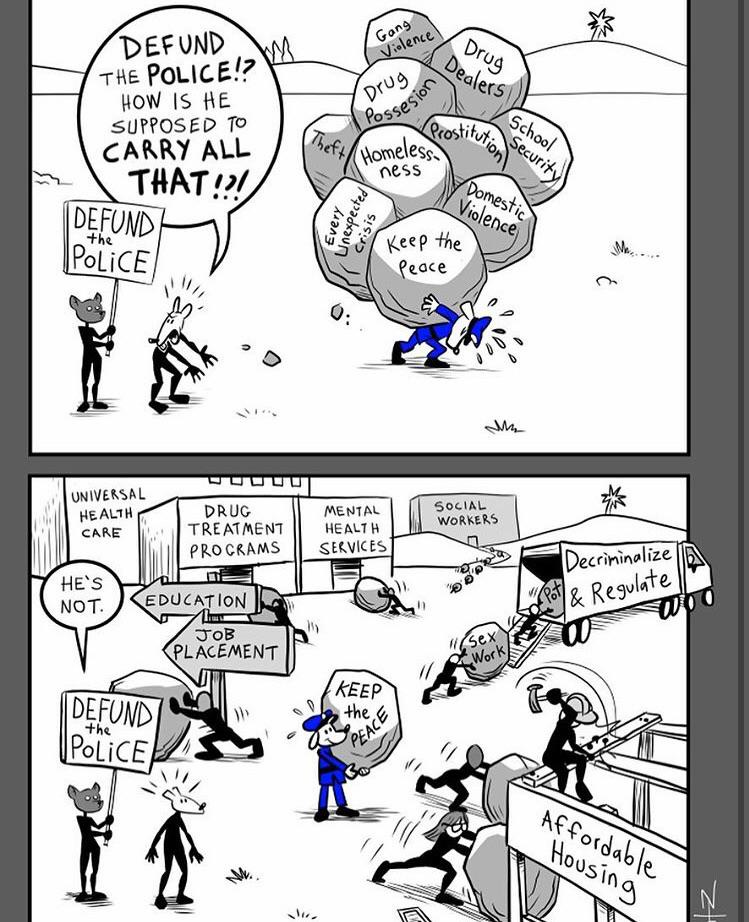Civil Service, the Survival Instinct, and a Troubling Double Standard - Issue #28
Extending the benefit of the doubt is a gracious and generous gesture. But when it comes to police shootings of people of color, that gesture needs to go both ways.
Author’s Note: I was right in the middle of writing this essay, inspired by the image below, when I learned about the police shooting death of 13-year-old Adam Toledo. Something has to change.
As this activist’s sign makes starkly clear, we are grappling with a destructive double standard. For decades, police misconduct has been widely excused on the basis that it's a difficult and dangerous job, and that if you haven't worn the uniform yourself, you're in no position to comment.
I would argue that this sentiment has led directly to not one, but two double standards, both of which have contributed repeatedly to tragedy, death, and a lack of accountability.
Double Standard #1
The first comes into play when we consider other, similarly public-facing occupations. For some reason, passionate belief in a professional’s right to do their job without any criticism or calls for reform does not seem to extend to other such fields.
Those who will not abide negative commentary about the police tend not to be shy about lambasting Common Core standards, or mocking teachers’ unions’ demands for safe working environments, or, as we all do from time to time, complaining about the efficiency of public works departments. Education, road maintenance, waste removal, and all the other services that we rightly see as benefits of living in a tax-revenue-driven, technocratic, neoliberal society? Go ahead and criticize them if they are not fulfilling their duties to your liking! You’re a taxpayer, after all! They work for you! Those sweet municipal employee pensions get funded on your dime!
But criticize the police? You are likely to get an earful. Check out this Dan Bongino fellow tearing into Geraldo Rivera, of all people, for even just halfheartedly criticizing policing methods and suggesting that race could be a relevant factor. Bongino might be a right-wing shill and unhinged conspiracy theorist, but his reactionary impulse, wherein law enforcement ought to be insulated from any and all non-glowing commentary, is extremely common.1
It’s a one-dimensional tactic for shutting down entirely legitimate concern, for dismissing the hardly-earth-shattering notion that systemic racism even exists. It smacks of the preening conservative ethos during the George W. Bush administration, wherein any deviation from Heritage Foundation-approved positions on foreign policy was reflexively construed as not adequately “supporting the troops.”
Double Standard #2
But this imbalanced treatment of different public-oriented professions is merely irksome compared to the second double standard: That is, as the pictured protester’s sign perfectly captures, the “Thin Blue Line” mentality that suggests it's excusable for a highly-trained professional to act on instinct, even when that instinct proves deadly, because of stress or pressure or the omnipresent potential for danger.
Such courteous acknowledgments of stress and pressure seem only to apply to the police themselves in these encounters. When unarmed, untrained2 civilians panic or slip into fight-or-flight mode, the results are compulsively reframed as garden variety resisting arrest. Any action by the officer, no matter how disproportional or inept, is explained away. And, inevitably, the suspect is retroactively made out to be some sort of unrepentant and irredeemable criminal mastermind.
Those who excuse police violence with commentary about officers' survival instincts and the overall difficulty of the job have, to some degree, a valid point. But it is troubling that they are unwilling to extend such graciousness to non-white people who, as even certain judicial bodies have noted, may be trying to avoid contact with police for perfectly legitimate reasons.
It is also troubling that such excusing tends to carry with it a subtext wherein racial profiling and systemic discrimination are simply nonexistent, that if every pulled-over person, regardless of race, conducted themselves in exactly the right way, these incidents would just NEVER happen.3
Very few people would deny that policing is stressful and difficult, and that it is reasonable for an officer’s adrenaline to spike when they engage in a traffic stop or encounter a suspect. This acknowledgment, in fact, is the foundation of the (somewhat-unfortunately-named) “Defund the Police” movement.
But it is unconscionable to give such generous benefit of the doubt to the trained professionals while giving so little benefit of the doubt to people who, for very real reasons, may also feel panic and adrenaline and the instinct for survival when the red and blue lights begin to flash.
The ideas and opinions expressed above are solely those of the author.
The Root is one of my favorite news-commentary sources, but I am a little bit resentful toward them at the moment. Before I read the linked article, I didn’t even know who Dan Bongino was. Now I do, and that sucks. Frankly, I could have happily lived the rest of my life without knowing anything about him.
If there is an iota of “training” for civilians in such matters, it is likely limited to exhortations from the social media commentariat to “obey the police and you’ll be fine!” or, in the case of many Black families, “the talk.”
The hypocrisy is especially galling when one considers the ideological overlap of the Blue Lives Matter mentality and virulent anti-mask sentiment over the last year. It is simply inarguable that those who regard the police as essentially above reproach are more likely to be conservative, and, in turn, more likely to take a “Don’t Tread on Me” stance with regard to a mildly-inconvenient public health mandate.






